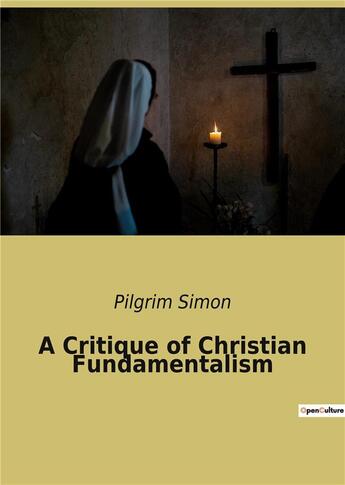Des idées de lecture pour ce début d'année !
Passionné(e) de lecture ? Inscrivez-vous
gratuitement ou connectez-vous pour rejoindre la
communauté et bénéficier de toutes les fonctionnalités du site !

Many Christians are very happy within the Christian Fundamentalist system. Of course they do not call themselves Christian Fundamentalists because this is now seen as a pejorative term with negative connotations - even though the term originated within their own ranks as a sort of 'back to basics' movement within the broader and more liberal protest- ant church. Terms come and go, but phrases such as 'Bible believing Christian' or 'Born again Christian' mean roughly the same thing.
However, if doubts begin to creep in to the believer's mind such that this theology begins to be openly, but sincerely questioned, then the believer may well find themselves subtly (or even not so subtly) threatened, ex- cluded, isolated, ostracised, unfairly criticised, disapproved of and so on.
There is the idea within Christian Fundamentalism that the 'truth' that they believe in is particular, exclusive and absolute. To question it is to question (and therefore doubt) God, to inquire into other religions is to 'go after other gods' or even to follow 'the devil and deceitful spirits'.
There is only 'one way' (which happens to be their way) to God. In this way, Christian Fundamentalism in ultra-orthodox.
The author takes the position that we cannot create a fixed or an ad- equate conception of God. The Divine is far too Transcendent to be bound by finite conceptualisations and theologies. In his view, belief sys- tems, theologies, conceptions of the Divine and so on serve to both reveal and mask the Transcendent - they can only point to That which cannot be known. Belief systems serve to give us finite creatures of form a relat- ive perspective of the Infinite. But as we draw near to the Formless, these forms fall away, rendered useless by the Vastness of the Absolute. So why pick on Christian Fundamentalism? It is one of a number of ap- proaches to the Godhead, so why critique this approach?
Il n'y a pas encore de discussion sur ce livre
Soyez le premier à en lancer une !

Des idées de lecture pour ce début d'année !

Si certaines sont impressionnantes et effrayantes, d'autres sont drôles et rassurantes !

A gagner : la BD jeunesse adaptée du classique de Mary Shelley !

Caraïbes, 1492. "Ce sont ceux qui ont posé le pied sur ces terres qui ont amené la barbarie, la torture, la cruauté, la destruction des lieux, la mort..."